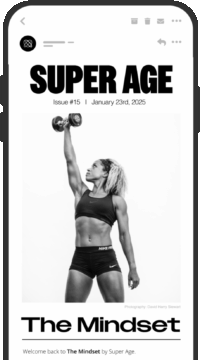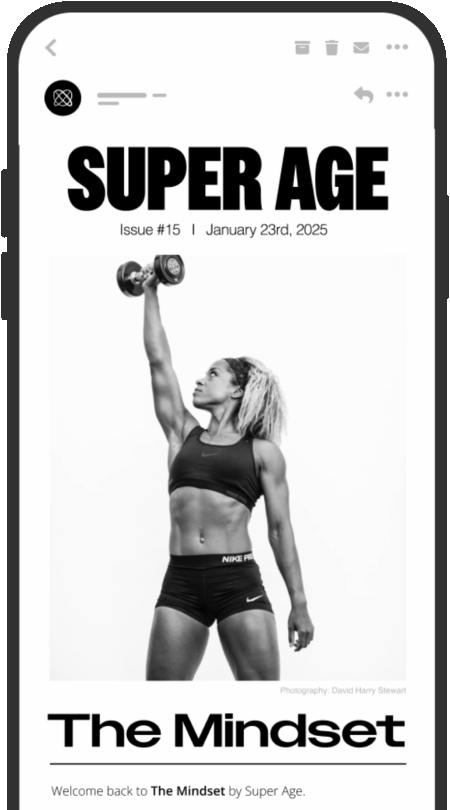How to Slow or Stop Your Drinking
Helen Rushbrook
If you’re not ready to quit alcohol entirely, new research shows that reducing your drinking, even just a little, can deliver big wins for your health, energy, and [lon-jev-i-tee]nounLiving a long life; influenced by genetics, environment, and lifestyle.Learn More.
If you’ve ever felt unsure about your relationship with alcohol, but didn’t resonate with the all-or-nothing messaging of traditional sobriety, you’re not alone. Even if you aren’t ready for the sober-curious path or to cut out alcohol altogether, which we recommend for optimal [helth-span]nounThe number of years you live in good health, free from chronic illness or disability.Learn More, a growing body of research shows that just mindfully cutting back can still lead to major health gains. And for adults focused on longevity, the right approach isn’t about shame or willpower. It’s about finding strategies that align with your life and your goals.
A 2024 review published in Harm Reduction Journal analyzed 61 studies across North America, Europe, and Australia and found that alcohol harm reduction (AHR) strategies, when they’re personalized, accessible, and flexible, can reduce alcohol-related risks, improve mental health, and increase quality of life. These interventions don’t require abstinence to be effective. Instead, they prioritize autonomy, trust, and pragmatic behavior change.
This is harm reduction, not as a buzzword, but as a flexible, science-backed philosophy for living better.
It’s Okay to Start with One Less Drink
One of the most empowering insights from the research: abstinence and harm reduction aren’t opposites. People may begin by cutting back, eventually decide to quit entirely, or move fluidly between different goals based on life circumstances. The most effective programs allow room for these shifts.
For many, total sobriety feels inaccessible. But the idea that it’s all or nothing keeps them from starting at all. The takeaway: You don’t have to quit drinking forever to experience real, measurable improvements in energy, sleep, metabolic health, and mood.
A randomized controlled trial out of Australia found that if you pair a clear reason for reducing your intake (your why) with a doable behavior change strategy (your how), your odds of success go way up.
In the study, people who saw a compelling health ad about alcohol’s risks and received a simple strategy (they were asked to keep count of their drinks) were significantly more likely to reduce their alcohol intake. On average, they drank nearly one drink less per week than the control group.
That might sound small, but across weeks and months, those reductions compound.
Do What Actually Works
The 2024 review identified five high-impact strategies that help people reduce alcohol harm, build [ri-zil-yuhns]nounThe ability to recover quickly from stress or setbacks.Learn More, and reclaim agency.
1. Build Skills for Real-Life Situations
Many people drink to manage stress, numb emotion, or cope with social pressure. Skills-based interventions teach practical, repeatable responses.
Try this:
- Use habit-change apps like Reframe or Sunnyside to support your efforts.
- Learn “urge surfing” or pause techniques (e.g., delay your first drink by 15 minutes). Here, cravings are conceptualized like waves in the ocean and you learn to “surf the urge” by allowing it to pass without being wiped out by giving into it.
- Practice scripting simple responses for social events (“I’m pacing myself tonight”)
These tools help build self-efficacy and the confidence that you can make changes that stick.
2. Get Support (Judgment-Free)
Alcohol use often intersects with stress, trauma, loneliness, or unmet needs. For adults in midlife, that might mean exploring how alcohol connects to [burn-out]nounPhysical or emotional exhaustion from chronic stress.Learn More, caregiving stress, or the pressures of reinvention, and finding support that honors the full context of your life. Evidence-based therapies like motivational interviewing (MI), cognitive-behavioral therapy (CBT), and [mahynd-fuhl-nis]nounThe practice of paying attention to the present moment with non-judgmental awareness.Learn More-based relapse prevention (MBRP) offer nonjudgmental support and behavior-change strategies that work over time.
Try this:
- Look for a provider trained in CBT or MI for alcohol use. Psychology Today has a searchable database of therapists.
- Try mindfulness apps that teach emotional regulation
- Check out platforms like Monument, Workit Health, or BetterHelp for online support from trusted experts.
3. Track Your Drinks and Set Goals
Digital interventions, especially those that include goal setting, tracking, and feedback, have helped people reduce harmful drinking, especially among those who value flexibility and privacy.
Try this:
- Track your drinking with Less or Hello Sunday Morning
- Set weekly targets and celebrate small wins
Tech-based options are particularly helpful for those not ready for group therapy settings or traditional treatment.
4. Find Community (On Your Terms)
Peer support is one of the most effective strategies in addiction science. But it’s not limited to 12-step models or abstinence-only frameworks. There are now secular, flexible communities focused on connection, resilience, and harm reduction.
Try this:
- Join a peer-led community like SMART Recovery or The Luckiest Club
- Explore moderated online spaces like r/stopdrinking
- Look for sober hangouts and events in your neighborhood. Even music festivals have dry events now.
Feeling seen, respected, and not judged is a catalyst for real, lasting change.
Your Sober Goals, Your Way
According to the research, the most effective alcohol reduction programs:
- Prioritize personal autonomy
- Set goals that reflect your values and needs
- Avoid shame, moralizing, or rigidity
- Integrate tools into your real life
If your goal is to drink less and feel better, without guilt, without giving up control, there are resources that can support you.
You don’t have to be “sober curious” or “alcohol dependent” to take stock of your drinking habits. And you don’t need to hit rock bottom to start climbing toward a better baseline. Whether you’re cutting back for sleep, energy, hormone balance, or brain health, research shows that even small, sustained shifts deliver measurable results.
Start where you are. Track a few drinks. Choose a strategy that feels doable. Ask for support if you want it. The path to more energy, clarity, and control might be just one habit away.
Here’s What Happens When You Cut Back on Alchohol: A Timeline of Wins
It takes around 24 hours for alcohol to leave your system. It’s important to hydrate during those 24 hours because alcohol dehydrates you.
After 1 Day:
Your liver starts balancing blood sugar. Brain fog lifts. You sleep better. You feel more hydrated.
After 1 Week:
Your sleep quality improves, your liver starts to heal, and your digestion stabilizes.
After 1 Month:
Your mood improves. Anxiety and depression symptoms ease. Blood pressure drops, [in-suh-lin sen-si-tiv-i-tee]nounHow effectively your body uses insulin, which regulates blood sugar levelsLearn More improves, and you may lose weight or body fat.
After 6 Months:
Liver damage from moderate drinking may be fully reversed. Immune function improves.
After 1 Year+:
Your risk for stroke, [hahrt dih-zeez]nounConditions affecting heart health and circulation.Learn More, diabetes, and multiple cancers drops significantly. Brain health, energy, and overall vitality climb.
Talk to your doctor if you’ve tried to cut back before and struggled, or if drinking is interfering with your relationships, sleep, or work. Getting support works. And remember, you’re not just removing a toxin. You’re gaining clarity, better sleep, improved energy, stronger immunity, and a longer healthspan.
It starts with a question: Why do I want to feel better? Then comes the plan: How can I do it in a way that feels good?
More Resources for Cutting Back or Quitting
Whether you’re ready to quit drinking entirely or just want to feel more in control, these trusted, expert-backed resources can help you take the next step, with clarity, support, and zero judgment
- Find a Therapist (Psychology Today)
Search for licensed therapists near you, including those trained in CBT, MI, and alcohol harm reduction. - SMART Recovery
A secular, science-based alternative to 12-step programs that teaches practical tools and self-empowerment. - SAMHSA National Helpline
Free, 24/7 confidential treatment referral and information service (1-800-662-HELP). - Alcoholics Anonymous (AA)
Worldwide peer-led support for people who want to stop drinking entirely. - Rethinking Drinking (NIAAA)
From the National Institutes of Health, offering tools, self-assessments, and guidance for low-risk drinking.
The information provided in this article is for educational and informational purposes only and is not intended as health, medical, or financial advice. Do not use this information to diagnose or treat any health condition. Always consult a qualified healthcare provider regarding any questions you may have about a medical condition or health objectives. Read our disclaimers.


